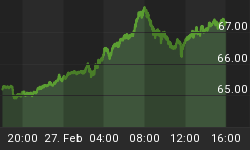You are no doubt aware that last Friday (May 10) Fed Chair Bernanke discussed the U.S. Federal Reserve's ongoing monitoring of the U.S. financial system. Importantly, he discussed the difference been early recognition of 'vulnerabilities' in any system before 'triggers' (or 'triggering events') cause the crystallization of those 'vulnerabilities' and promote a resulting 'crisis'. Conceptually, the recognition of 'vulnerabilities' ahead of 'triggering events' is applicable to most things in life.
Interestingly, early in his Friday speech Mr. Bernanke said: "it is reasonable to ask whether systemic risks can in fact be reliably identified in advance" and further said: "after all, neither the Federal Reserve nor economists in general predicted the past (2007 - 2009 as he defines it) crisis". One might fairly ask why the Federal Reserve and 'economists in general' failed to predict the sub-prime crisis. After all, some economists (Nouriel Roubini for example) and others saw much earlier that (among other things):
-
U.S. home owners were borrowing against escalating U.S. house prices to support and enhance their life styles;
-
simultaneously large numbers of U.S. manufacturing jobs were being lost to developing countries, and U.S. net trade deficits were escalating; and,
-
the U.S. National Debt was continuing to escalate as a result of ongoing U.S. Federal Government annual deficits.
It seems to me one might also ask why Mr. Bernanke may be of the mind that the 2008 financial crisis he seems to imply ended in 2009 is behind us. This when continued U.S. quantitative easing, low interest rates, high unemployment rates, high net monthly trade deficits, sequester, and significant annual federal deficits and related 'debt ceiling' problems continue to be the 'order of the U.S. day'.
Mr. Bernanke said the Federal Reserve has developed, and continues to develop, monitoring programs that follow (among other things) four financial system 'components' being:
-
systemically important financial institutions (read the 'too big to fail' investment banks), where he discusses the bank stress tests introduced in 2012 and that are ongoing. I have previously commented that after carefully reading the first Federal Reserve bank stress test report I concluded that it largely was an 'academic exercise' that I don't think proved a great deal. You can read that commentary at The U.S. Federal Reserve Bank Stress Tests (March 16, 2012);
-
shadow banking, which he defines as "various markets and institutions that provide financial inter-mediation outside the traditional, regulated banking system" where the Federal Reserve's monitoring includes a "survey of senior credit officers at dealers (who track) conditions in markets such as those for securities financing, prime brokerage, and derivatives trading". Speaking only to 'derivatives trading', as best I know it is difficult to quantify outstanding derivatives at any given point in time. How much more difficult must it be to 'monitor them' in an unregulated environment?;
-
asset markets, which he says includes fixed-income instruments, corporate equities, real estate, commodities, and structured credit products, where a "variety of models and methods" are used to try to "identify unusual patterns; and,
-
the non-financial sector, which he says includes households and businesses.
Essentially, a good part of this monitoring as Mr. Bernanke describes it seems to be in part dependent of an assessment by the Federal Reserve:
-
of data generated by 'the camels in the proverbial tents' who have a vested interest in the conclusions reached by the Federal Reserve as to 'vulnerabilities'; and,
-
by using historic 'markers' such as financial markets price-earnings ratios, where I continue to believe that many financial and economic ratios prevailing pre-2000 (and even later) likely are poor proxies to be currently taken as predictive.
I did not come away from my reading of Mr. Bernanke's Friday speech with a warm and convinced feeling that the Federal Reserve's monitoring actions will enable it to adequately identify 'economic system vulnerabilities' on a timely basis. Hence, I am more of a mind that while the good intentions of Mr. Bernanke and his colleagues are laudible, the next 'triggering events' may be upon us all before they are diffused.
If you participate in the financial markets, I suggest you read Monitoring the Financial System. While you do that, I suggest you recall the old saying 'Fool me once, shame on you, fool me twice, shame on me'.
Reference: Monitoring the Financial System, from The Federal Reserve, May 10, 2013 - reading time 8 minutes.















